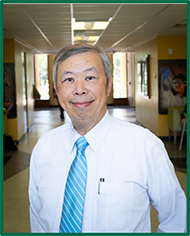Faculty and Staff
Kwang-Cheng Chen, PhD

RESEARCH INTERESTS
Dr. Chen's research focuses on (1) quantum engineering: quantum communications, quantum computing, quantum machine learning, quantum sensing, quantum cryptography, and quantum photonics (2) artificial intelligence and multi-robot systems with applications to smart factory and self-driving (3) wireless communications and networking, particularly 6G and communication for AI (4) cryptographic systems, post-quantum cryptography, and cybersecurity (5) social networks and data analytics
BIOGRAPHY
Dr. Chen received BS from National Taiwan University (1983), MS and PhD from University of Maryland, College Park (1987, 1989), all in electrical engineering. He was with SSE, COMSAT, IBM T.J. Watson Research Center, HP Labs., National Tsing Hua University (Taiwan), and National Taiwan University; visited TU Delft (Netherland), Aalborg University (Denmark), SKKU (Korea), and MIT. Since 2016, Dr. Chen has been a professor with the Department of Electrical Engineering, University of South Florida. He started an IC design company which was acquired by the MediaTek Inc. Dr. Chen received a few IEEE awards for achievement and papers.
Research
My research aims at innovating technologies and advancing engineering solutions, with focusing topics:
- Quantum computing: quantum machine learning, quantum optimization, computer aided design tools for quantum computers and computations, quantum error correction, quantum processor design/implementation, programming quantum processors, and room-temperature quantum computers & integrated circuits/photonics
- Quantum communications, quantum networking and Internet, quantum-inspired remote sensing and imaging, quantum communication/information theory, quantum distributed computing, and quantum application-specific processors, with focusing on quantum optical wireless systems and prototyping.
- Quantum cryptography and quantum secure computing/networking.
- Wireless communications and networking, with focus on ultra-low latency mobile communications, 6G & vertical applications, next generation wireless LANs
- Multi-agent systems, wireless networked multi-robot systems and applications to smart factories and autonomous vehicles.
PhD students, post-doc researchers, and visiting scholars are welcome
Honors and Awards
IEEE Fellow (2007), AAIA Fellow (2023), IEEE Jack Neubauer Memorial Award (2014), IEEE ComSoc AP Outstanding Paper Award (2014), IEEE Communications Society WTC (Wireless Communications) Recognition Award (2011), paper awards in IEEE ICC, GLOBECOM, PIMRC, WPMC.
Keynotes in recent years: ITU-T Workshops (San Jose, 2018 and Geneva, 2019), 2017 IEEE WiMob, 2019 IEEE ICCC, 2018 Strategy Workshop in Norway, 2019 FABULOUS, 2019 BalkanCom, WPMC 2019, VFCS 2019 (organized by European Commission), WPMC 2020 (Toward Quantum Photonic Wireless Communications and Computing), SGIOT 2020, ICCSIT 2021 & 2022 (From Quantum Computing to Post-Quantum Cryptographic Systems), FICC 2022, WPMC 2022, IEEE ICC Workshops 2022, AISS 2023 (Gate-Based Quantum Computing and Quantum Neural Networks), ICISS 2023 (Quantum Computations – Architecture and Implementation), IEEE NOMS Workshop 2023, TU Sofia Workshop (Quantum Cryptography, Quantum Imaging and Hologram), One6G Workshop 2023.
Publications
5 recent journal publications and 5 recent conference publications (Google Scholar)
[1] Y. Zhang, K.-C. Chen, G. Zheng, X. Chu, J. Xu, “Guaranteed Capacity of Uplink URLLC”, to appear in the IEEE Wireless Communications Letters.
[2] Z. Nie, K.-C. Chen, K. Kim, “Social-Learning Coordination of Collaborative Multi-Robot Systems Achieves Resilient Production in a Smart Factory”, to appear in the IEEE Transactions on Automation Science and Engineering.
[3] Y. Wang, K.-C. Chen, Z. Gong, Q. Cui, X. Tao, P. Zhang, “reliability-Guaranteed Uplink Resource Management in Proactive Mobile Network for Minimal Latency Communications”, IEEE Tr. on Wireless Communications, vol. 22, no. 8, August 2023.
[4] C. Murudhar, K.-C. Chen, R. Gitlin, “Network Architecture for Machine Learning: A Network Operator’s Perspective”, IEEE Communications Magazine, vol. 60, no. 7, pp. 68-74, July 2022.
[5] N. Nguyen, K.-C. Chen, “Quantum Embedding Search for Quantum Machine Learning”, IEEE Access, vol. 10, pp. 41444-41456, 2022.
[6] A. Bristow, K.-C. Chen, “Pragmatic Quantum-Classic Phase Estimation of a Quantum Channel”, IEEE Military Communications Conference, 2023.
[7] R. Kaliski, K.-C. Chen, “Opportunistic Multiple Access for Reliable Minimal Latency Communications”, IEEE GLOBECOM, 2023.
[8] A. Dinkins, A. Bristow, K.-C. Chen, “A Computer Aided Design Tool for NISQ Logic Synthesis”, International Symposium on Wireless Personal Multimedia Communications, 2023.
[9] Z. Nie, K.-C. Chen, Y. Alanezi, “Socially Networked Multi-Robot System of Time-Sensitive Multi-Link Access in a Smart Factory”, IEEE International Conference on Communications, 2023.
[10] A. Bristow, K.-C. Chen, “Low-Complexity Quantum Channel Phase Estimation”, International Symposium on Wireless Personal Multimedia Communications, Denmark, 2022. Paper Award (Contribution to Research on Fundamental Theory)
Courses
- EEL 6590, EEE 4423 Quantum Computing and Communications (Spring Semester): In-depth knowledge in quantum entanglement and applications, quantum logic gates,
quantum algorithms, quantum computers, quantum cryptography, quantum communications,
quantum error correction, and quantum information theory, with the need of knowledge
in modern physics.
- EEL 6029 Statistical Inference (Spring Semester):
A mathematical course in EE to introduce statistics and inference, detection and estimation, and statistical foundation of machine learning. - EEL 6935 Robotics and AI (Fall Semester):
Project-Based learning for AI algorithms, decisions, reinforced learning, and signal processing and wireless techniques useful to robotics, particularly autonomous mobile robots. Textbook: K.-C. Chen, Artificial Intelligence in Wireless Robotics, River, 2020 (also available in the IEEE Xplore).